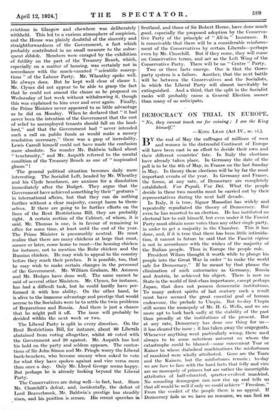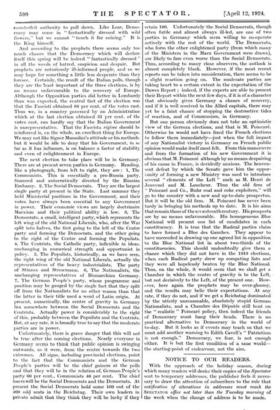DEMOCRACY ON TRIAL IN EUROPE.
-KING LEAR (Act IV., sc. vi.). " No, they cannot touch me for coining ; I am the King himself."
BY the end of May the suffrages of millions of men and women in the distressful Continent of Europe will have been cast in an effort to decide their own and their different countries' fate. In Italy the elections have already 'taken place.- In Germany the date. of the poll is to be the 4th of May, in France on the last Sunday in May. In theory these elections will be by far the most important events of the year. In Germany and France, the forms, at any rate, of Democracy are completely established. Vox Populi, Vox Dei. What the people decide in these two months must be carried out by their representatives during the next half decade.
In Italy, it is true, Signor Mussolini has widely and repeatedly repudiated the theory of Democracy. But even he has resorted to an election. He has instituted an electoral law to suit himself, but even under it the Fascist Party must obtain more votes than any other single party, in order to get a majority in the Chamber. This it has done, and, if it is true that there has been little intimida- tion, it cannot in future be said that the Fascist regime is not in accordance with the wishes of the majority of the Italian people. Thus in Europe the people rule.
President Wilson thought it worth while to plunge his people into the Great War in order " to make the world safe for Democracy." If he meant by that phrase the elimination of such autocracies as Germany, Russia and Austria, he achieved his object. There is now no State in the world of first-class importance, except perhaps Japan, that does not possess democratic institutions. To many ardent spirits of last century such a result must . have seemed the great essential goal of human endeavour, the prelude to Utopia. But to-day Utopia still seems the monopoly of Mr. H. G. Wells, and we are more apt to look back sadly at the stability of the past than proudly at the institutions of the present. But at any rate, Democracy has clone one thing for us— it has cleared the issue ; it has taken away the scapegoats.
Whenever anything went particularly wrong, there used always to be some notorious autocrat on whom the catastrophe could be blamed—some convenient Tsar or Kaiser to whose diabolical machinations the misfortunes of mankind were wholly attributed. Gone are the Tsars and the Kaisers, but the misfortunes remain ; to-day we are face to face with the hard facts that folly and vice are no monopoly of princes but are rather the incorrigible attributes of half-educated, quarter-evolved mankind.
No consoling demagogue can now rise up and tells us that all would be well if only we could achieve " Freedom."
From the verdict' of the people there is no appeal. If Democracy fails us we have no resource, we can find no counterfeit authority to pull down. Like Lear, Demo- cracy may come in " fantastically dressed with wild flowers," but we cannot " touch it for coining." It is the King himself.
And according to the prophets there seems only too much chance that the Democracy which will declare itself this spring will be indeed " fantastically dressed " in all the weeds of hatred, suspicion and despair. But prophets are notoriously ill-informed people, and so we may hope for something a little less desperate than they foresee. Certainly, the result of the Italian polls, though they are the least important of the three elections, is by no means unfavourable to the recovery of Europe. Although the Opposition parties did better in Lombardy than was expected, the central fact of the election was that the Fascisti obtained 66 per cent. of the votes cast. Thus we, in a country governed by an Administration which at the last election obtained 31 per cent. of the votes cast, can hardly say that the Italian Government is unrepresentative. That the Fascista regime should be reinforced is, on the whole, an excellent thing for Europe. We may not like Signor Mussolini's attitude or his methods- but it would be idle to deny that his Government, in so far as it has influence, is on balance a factor of stability and even of enlightenment in Europe.
The next election to take place will be in Germany. There are at present seven parties in Germany. Reading. like a photograph, from left to right, they are : 1, The Communists. This is essentially a pro-Russia party, financed and autocratically directed by the Russian Embassy. 2, The Social Democrats. They are the largest single party at present in the State. Last summer they held Ministerial positions in the Government, and their votes have always been essential to any Government in power. Their economic views are largely doctrinaire Marxism and their political ability is low. 3, The Democrats, a small, intelligent party, which represents the left wing of the old National Liberals, who, after the War split into halves, the first going to the left of the Centre party and forming the Democrats, and the other going to the right of the Centre and forming the Populists. 4, The Centrists, the Catholic party, inflexible in ideas, unchanging in numerical strength and opportunist in policy. 5, The Populists, historically, as we have seen, the right wing of the old National Liberals, actually the representatives of the heavy industrialists. The party of Stinnes and Stresemann. 6, The Nationalists, the unchanging representatives of Bismarekian Germany. 7, The German People's party, whose programme and position may be gauged by the single fact that they split off from the Nationalists for no other reason than that the latter in their title used a word of Latin origin. At present, numerically, the centre of gravity in Germany lies somewhere between the Social Democrats and the Centrists. Actually power is considerably to the right of this, probably between the Populists and the Centrists. But, at any rate, it is broadly true to say that the moderate parties are in power.
Unfortunately, there is grave danger that this will not be true after the coming elections. Nearly everyone in Germany seems to think that public opinion is swinging outwards, as it were, from the centre towards the two extremes. All signs, including provincial elections, point to the fact that the Communists and the German People's parties will be the chief gainers at the polls and that they will be in the relation of, German People's party 60 per cent., Communists 40 per cent. The chief losers will be the Social Democrats and the Democrats. At present the Social Democrats hold some 160 out of the 400 odd seats in the Reichstag. Their own leaders in private admit that they think they will. be lucky if they retain 100. Unfortunately the Social. Democrats, though often futile and almost always ill-led, are one of two parties in Germany which seem willing to co-operate • actively with the rest of the world. The Democrats, who form the other enlightened party (from which many of the Ministers in the Marx Government were drawn), are likely to fare even worse than the Social Democrats. Thus, according to many close observers, the outlook is almost completely black. However, if the most recent reports can be taken into consideration, there seems to be a • slight reaction going on. The moderate parties are taking heart to a certain extent in the expectation of the Dawes Report ; indeed, if the experts are able to present their Report within the next few days, if it is of a character that obviously gives. Germany a chance of recovery, and if it is well received in the Allied capitals, there may yet be a faint chance of stopping. the destructive tides of reaction, and of Communism, in Germany.
But one person obviously does not take an- optimistic • view of the German elections, and that is. M. Poincare. Otherwise: he would not have fixed the French elections • to follow them immediately—just when the full impact of any Nationalist victory in Germany on French public opinion would make itself most felt. From this manoeuvre - and from the formation of his new Government it is obvious that M. Poincare although by 310 means despairing of his cause in France, is decidedly anxious. The heaven- sent defeat by which: the Senate gave him the oppor- tunity of forming a new Ministry was used to introduce several " elements of the Left " such as M. Henri de Jouvenel and M. Loucheur. Thus the old firm of " Poincare and Co., Ruhr coal and coke exploiters," will go to the country with a new and up-to-date prospectus. But it will be the old firm. M. Poincare has never been tardy in bringing his methods up to date. It is his .aims • that remain those of the seventeenth century. His prospects are by no means unfavourable.. His homogeneous Bloc National will present one list of candidates in each constituency, It is- true that the Radical parties claim to have formed a Bloc des Gauche& They appear to have succeeded in drawing up one agreed list in opposition to the Bloc National list in about two-thirds of the constituencies. This should undoubtedly give them a chance which they did not have in the 1919 elections, when each Radical party -drew up competing lists and they were all hopelessly beaten by the Bloc National. Thus, on the whole, it would seem that we shall get a Chamber in which the centre of gravity is to the Left, • but not decisively to the Left, of the present one. How- ever, here again the prophets may be over-gloomy, and the results may belie their expectations. At any _ rate, if they do not, and if we get a Reichstag dominated by the utterly unreasonable, absolutely stupid German . Nationalists, and a Chambre des Deputes still bent on the " realistic " Poincare policy, then indeed the friends, of Democracy must hang their heads. There is no. practical alternative to Democracy in the world of to-day. But it looks as if events may teach us that we- must add another warning to Edith Cavell's " Patriotism is not enough." Democracy, we fear, is not enough either. It is but the first condition of a sane world— the starting-point of endeavour, not the aim.











































 Previous page
Previous page